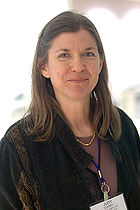 Bjorn Lomborg is in the news again. He’s changed his tune, says a Guardian headline, announcing the forthcoming publication of a new book edited by him, Smart Solutions to Climate Change: Comparing Costs and Benefits. That was a pretty quick change, I thought, recalling what I heard him say on a panel at the PEN World Voices Festival, back in May. He followed the famed Norwegian novelist Jostein Gaarder and the leading climatologist James Hansen. I wrote about it on Hot Topic at the time. Neither the passion of Gaarder nor the scientific logic of Hansen was for him. He admittedly presented himself as an advocate for tackling global warming, but without a shred of scientific reference he spoke of the need for “balanced information” and a move from the end-of-world kind of story. “Apocalyptic information” turns people off, he said, and is part of the reason why there has been a decline in public concern about global warming over the past year. That, plus problems in the IPCC report such as those relating to the Himalayan glaciers. In other words, it’s the scientists who point to the great danger we are in who are to blame for the lack of public concern. The relentless denialist campaign seemingly has nothing to do with it. As I listened I simply thought you obviously haven’t bothered to follow the science. You’ve sniffed out a strategic political position, safely positioned between science and denial. Perhaps that was unfair of me. But I’d reviewed Howard Friel’s painstaking book The Lomborg Deceptiona few weeks previously, and what Lomborg was saying fitted Friel’s analysis.
Bjorn Lomborg is in the news again. He’s changed his tune, says a Guardian headline, announcing the forthcoming publication of a new book edited by him, Smart Solutions to Climate Change: Comparing Costs and Benefits. That was a pretty quick change, I thought, recalling what I heard him say on a panel at the PEN World Voices Festival, back in May. He followed the famed Norwegian novelist Jostein Gaarder and the leading climatologist James Hansen. I wrote about it on Hot Topic at the time. Neither the passion of Gaarder nor the scientific logic of Hansen was for him. He admittedly presented himself as an advocate for tackling global warming, but without a shred of scientific reference he spoke of the need for “balanced information” and a move from the end-of-world kind of story. “Apocalyptic information” turns people off, he said, and is part of the reason why there has been a decline in public concern about global warming over the past year. That, plus problems in the IPCC report such as those relating to the Himalayan glaciers. In other words, it’s the scientists who point to the great danger we are in who are to blame for the lack of public concern. The relentless denialist campaign seemingly has nothing to do with it. As I listened I simply thought you obviously haven’t bothered to follow the science. You’ve sniffed out a strategic political position, safely positioned between science and denial. Perhaps that was unfair of me. But I’d reviewed Howard Friel’s painstaking book The Lomborg Deceptiona few weeks previously, and what Lomborg was saying fitted Friel’s analysis.
Then just last month he produced an article (accessible from here) claiming that we have the capacity to readily adapt to even a 6 metre sea level rise. Only 400 million people would be affected, about 6% of the world’s population, and most of them live in cities where they could be protected relatively easily.
“94% of the population would not be inundated. And most of those who do live in the flood areas would never even get their feet wet. […] The point isn’t that we can or should ignore global warming. The point is that we should be wary of hyperbolic predictions. More often than not, what sound like horrific changes in climate and geography actually turn out to be manageable – and in some cases even benign.”
This hardly presaged a change of tune. I haven’t seen a copy of the new book, nor will I be seeking to. But books take time to publish and the things that an author is saying and writing in the months preceding release are unlikely to be at variance with what the forthcoming book will have to say.
Joe Romm, who is deeply unimpressed by the news of the book, quotes from its penultimate paragraph:
“It is unfortunate that so many policy makers and campaigners have become fixated on cutting carbon in the near term as the chief response to global warming.”
“Seriously” is Romm’s one-word response.
It’s not that Lomborg thinks we can avoid responding to global warming. It’s rather that he has a better way than cutting emissions. His final paragraph:
“If we care about the environment and about leaving this planet and its inhabitants with the best possible future, we actually have only one option: we all need to start seriously focusing, right now, on the most effective ways to fix global warming.”
That involves using money raised by a carbon tax (a small one of $7 a ton, in case that alarms anyone).
“Investing $100bn annually would mean that we could essentially resolve the climate change problem by the end of this century.”
Sounds like good news. And in some ways it is. The areas that Lomborg and his fellow writers propose spending money on include research and development of clean energy options, planting more trees, reducing soot and methane, and investigating geo-engineering projects such as “cloud whitening”. There’s little to argue with there, and presumably that’s how he managed to get a commendation of the book from Rajendra Pachauri, who welcomed Lomborg’s statement that we have ‘long moved on from any mainstream disagreements about the science of climate change’.
So it looks like a change of emphasis from Lomborg, though he maintains he has never denied anthropogenic global warming. He even acknowledged to the Guardian reporter that there could be “something really bad lurking around the corner”. But it’s hardly change enough. Cutting carbon emissions is our only hope of avoiding really serious multiple consequences from global warming. That is the clear message of the science. The notion that we can get by without seriously addressing that need is not founded on science. Lomborg’s message is welcomed by fossil fuel vested interests because it suggests we can carry on doing what we are at the same time as covering any damage we may be laying up for the future. Gerry Brownlee’s draft NZ Energy Strategy fits very nicely into that delusion.
I’ll give Howard Friel, writing in the Guardian, the last word.
“Lomborg still argues in this book, as he did in the others, that cost-benefit economics analysis shows that it is prohibitively expensive for the world to sharply reduce CO2 emissions to the extent required by the scientific evidence.
“…what will happen to the earth and human civilisation when atmospheric CO2 concentrations rise – essentially unchecked, if we followed Lomborg’s recommendations – to 450 parts per million, 550ppm, 700ppm, 800ppm; and when the average global temperature rises by 2C, 3C, and 4C to 7C?
“Climate scientists have set 350ppm and a 2C average temperature rise (from 1750 to 2100) as the upper range targets to prevent a global climate disaster. Since we are already at 390ppm and since a 2C plus rise is a near certainty, how does Lomborg’s appeal to forgo sharp reductions in CO2 emissions reflect climate science? He argues that there are ‘smarter solutions to climate change’ than a focus on reducing CO2. This is hardly smart: it’s insanity.”
Like this:
Like Loading...
This review of Bob Carter’s latest book, by Dr James Renwick, Principal Scientist at NIWA’s Climate Variability & Change group, was first published in the March newsletter of the Geoscience Society of New Zealand. My thanks to Jim for permission to republish it here.

 Ross Garnaut, the Australian government’s climate change adviser, today published the science update [
Ross Garnaut, the Australian government’s climate change adviser, today published the science update [
 Bjorn Lomborg is in the news again. He’s changed his tune, says a Guardian
Bjorn Lomborg is in the news again. He’s changed his tune, says a Guardian